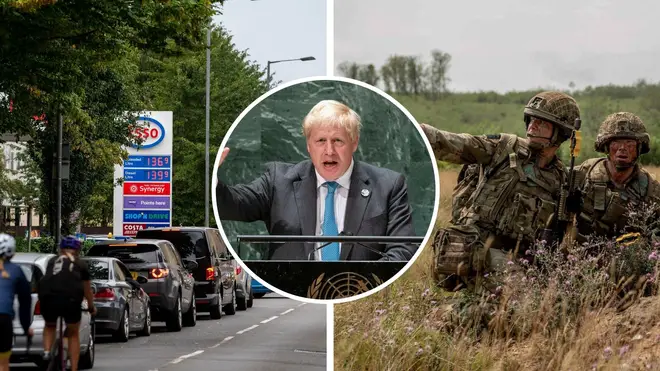
Shelagh Fogarty 1pm - 4pm
1 October 2021, 22:00 | Updated: 2 October 2021, 00:07

The military will start delivering fuel to petrol stations as panic buying leads to forecourts getting cleared out amid a shortage of HGV drivers.
Just under 200 military tanker personnel - of which 100 are drivers - have finished their training and will deploy from Monday to restock the pumps.
The Government hopes this, along with other measures, will help with the supply chain as motorists form huge queues at forecourts which have struggled with panic buying, while tempers frayed.
Defence Secretary Ben Wallace said: "Across the weekend over 200 military personnel will have been mobilised as part of Operation Escalin.
"While the situation is stabilising, our Armed Forces are there to fill in any critical vacancies and help keep the country on the move by supporting the industry to deliver fuel to forecourts."
Read more: Some petrol stations in Suffolk and Essex to prioritise key workers
Read more: Fuel crisis: London and South East hit hardest as drivers 'fill up with £1.72 of petrol'

Sadiq Khan warns of consequences of 'petrol rage' amid fuel crisis
The Government has stressed that the problem is not down to there being no fuel – the shortages have instead come from a lack of drivers to transport it from refineries and terminals to petrol stations.
It has stressed that if people don't panic buy and purchase fuel as they usually would, levels will return closer to normal, but those pleas have fallen on deaf ears for many.
The Petrol Retailers Association said the situation has been improving, but slowly, while the Government said more fuel is now being delivered than is being bought.
It said one in four stations had no fuel.
There are also fears about longer-term impacts of the lack of HGV drivers, including whether Christmas will see disruption.
The pandemic worsened a global shortage of drivers, but in the UK there has been a long running issue with the number of available HGV operators.

Boris Johnson: England's fuel crisis stabilising
This has been put down to an ageing workforce, low wages and poor conditions in places designated for lorries to stop. Some estimates suggest there is a shortfall of about 90,000 drivers across the industry.
The Government said 300 fuel drivers will be able to arrive immediately in the UK, subject to immigration checks, and work until the end of March next year.
Temporary, short-term visas have also been offered for 4,700 food haulage drivers and 5,500 poultry workers.
The temporary visa scheme for foreign HGV drivers was due to expire on Christmas Eve, but it has now been announced that its expiry date will be pushed to the end of February after criticism over whether workers would be put off by such a short term.
However, in a statement on Friday, the Government said the visas will not be a long-term solution. It wants employers to make investments in the domestic workforce instead of relying on overseas labour.
Steve Barclay, the Chancellor of the Duchy of Lancaster, said: "The Government has taken decisive action to tackle the short term disruption to our supply chains, and in particular the flow of fuel to forecourts.
"We are now seeing the impact of these interventions with more fuel being delivered to forecourts than sold and, if people continue to revert to their normal buying patterns, we will see smaller queues and prevent petrol stations closing."